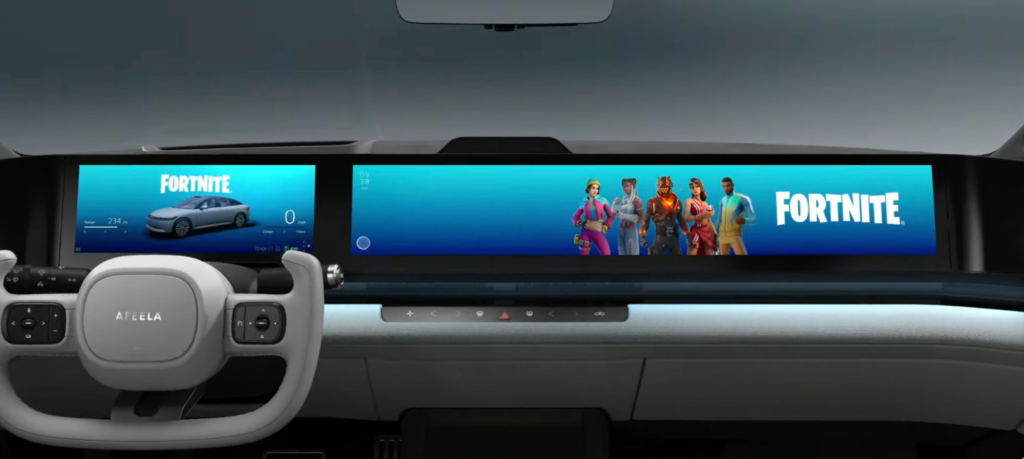Innovative Fusion: Sony Integrates PS5 Controller to Drive AFEELA EV Live at CES
Sony is embarking on its fifth consecutive year of unveiling its forthcoming electric vehicle during CES press events. Last year, it was revealed that the car would be named AFEELA and is slated for a market debut in 2026.
This year’s press conference centered on Sony’s software strategies for the upcoming vehicle, featuring an abundance of cutting-edge terms, predominantly related to artificial intelligence.

As a quick review, the AFEELA concept initially promised a dual-motor all-wheel-drive with 400kW (536hp), accelerating from 0-100km/h (0-62mph) in 4.8 seconds and boasting a top speed of 240km/h (149mph). To the best of our knowledge, these specifications remain Sony’s targets. However, details regarding the price or battery size are still elusive. With two more years until the vehicle hits the road, pricing information is expected to be disclosed later.
Sony is leveraging its expertise in electronics by emphasizing the car’s sensing and infotainment systems. Similar to the trend in most contemporary electric vehicles, the AFEELA will incorporate a comprehensive array of sensors to support potential autonomous driving capabilities.
Sony envisions enhancing the in-car entertainment experience by leveraging its extensive background in consumer entertainment. With a focus on superior infotainment, Sony aims to introduce seamless over-the-air software updates. The company has showcased interior photos featuring expansive displays in both the front and rear seats, hinting at the possibility of PS5-level gaming performance within the vehicle. This move positions Sony as a potential contender in the high-end gaming device market, competing with the likes of Tesla in the $100,000 range.
To demonstrate its commitment beyond a mere concept, Sony has taken concrete steps, forming a strategic partnership with Honda to establish Sony Honda Mobility, Inc. Notably, Sony received top billing in the collaboration, showcasing its dedication to the project, perhaps overshadowing Honda’s reservations about electric vehicles (EV).
During a recent press conference, Sony welcomed Honda CEO Toshihiro Mibe on stage to discuss the transformative nature of mobility, emphasizing a significant shift occurring once in a century. Despite Mibe’s speech avoiding explicit mention of electric vehicles, the collaboration with Honda underscores Sony’s serious intent in the automotive sector.
Yasuhide Mizuno, CEO of Sony Honda Mobility Inc., took the stage to delve into the in-car software experience. To highlight the car’s software-defined nature, he captivated the audience by driving the vehicle onto the stage using a PS5 controller.
However, temper your enthusiasm as he clarified that this demonstration was specifically intended for showcasing purposes.
Nonetheless, the showcased presentation underscores a noteworthy shift in the automotive landscape, with cars increasingly defined by software rather than hardware. With software exerting profound control over vehicle functions, the potential for over-the-air updates to modify various aspects of the driving experience and enhance vehicles over time is evident. However, this reliance on software also implies a heightened susceptibility to software-related issues, surpassing the challenges encountered in the pre-digital era of automobiles.
Sony envisions the software-defined nature of the car transforming it into a “digital playground,” providing a canvas for creators to innovate and introduce novel in-car experiences. As an illustration, a game was presented, featuring a vehicle navigating a simulated world alongside Godzilla-like monsters, offering players points for capturing them.
It also expressed its desire to “nurture a collaborative community between users and creators” by offering “access to vehicle data” to bring forth “innovative ideas.” This statement raises concerns, as it has a somewhat Orwellian undertone, especially when considering the subsequent introduction of Microsoft, colloquially referred to as “Big Brother,” to announce a partnership related to AI. I admit to tuning out a bit during this segment, as the saturation of AI buzzwords this year has been overwhelming.
Sony concluded the press conference without providing additional information on crucial aspects such as pricing, battery details, the long-awaited SUV version unveiled two years ago that remains elusive, or a reaffirmation of the previously stated 2026 release timeline.
Electrek’s Perspective
When Sony first unveiled a concept EV in 2020, the prevailing sentiment was skepticism about the influx of concept EVs from various players. Over the years, we’ve witnessed numerous concept EVs, each varying in levels of seriousness.
Sony’s entry, initially perceived as a potential addition to the less-serious category, defied expectations. Its design appeared refined and reasonable, steering clear of extravagant claims made by some counterparts. At that juncture, there was a genuine belief that Sony might actually bring this concept to fruition. Subsequent developments, such as on-road testing, the introduction of an SUV variant (albeit briefly showcased and notably absent for two consecutive years), the collaboration with Honda, and the revelation of a product name and production date (with a reasonably outlined timeline, at least 7 years after the car’s development initiation), have collectively demonstrated steady progress with each update.
However, the frequency of Sony’s mentions at CES conferences has become a noteworthy trend. While commendable for taking the necessary time to develop the car, the numerous press conferences dedicated to this singular project, if the trend persists, will reach seven consecutive appearances by the time the car is launched. Transitioning from consumer electronics to automotive manufacturing is a significant shift for Sony, and they seem to be maximizing the publicity around this concept.
In contrast, another consumer electronics giant rumored to be working on a car, Apple, has maintained a notably different strategy. Apple has never publicly discussed its rumored car project. While some question the wisdom of Apple entering the automotive industry, considering their historical focus on products that can fit on a single table (as emphasized by Tim Cook), the company’s approach to press strategy sharply contrasts with Sony’s.
This contrast was particularly evident in the most recent presentation. Unlike previous years, where each presentation unveiled substantial new information, this year’s update appeared somewhat superficial. In the era dominated by the buzzword “AI,” every company strives to align its image with artificial intelligence, hoping for success akin to that of NVDA.
